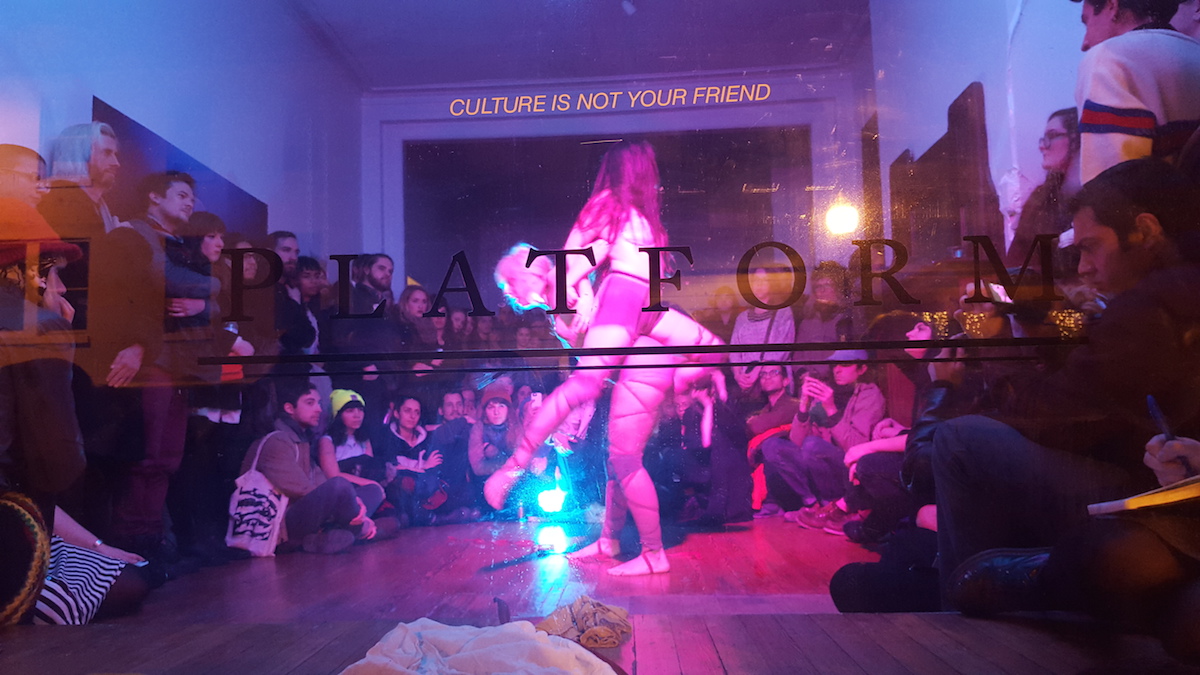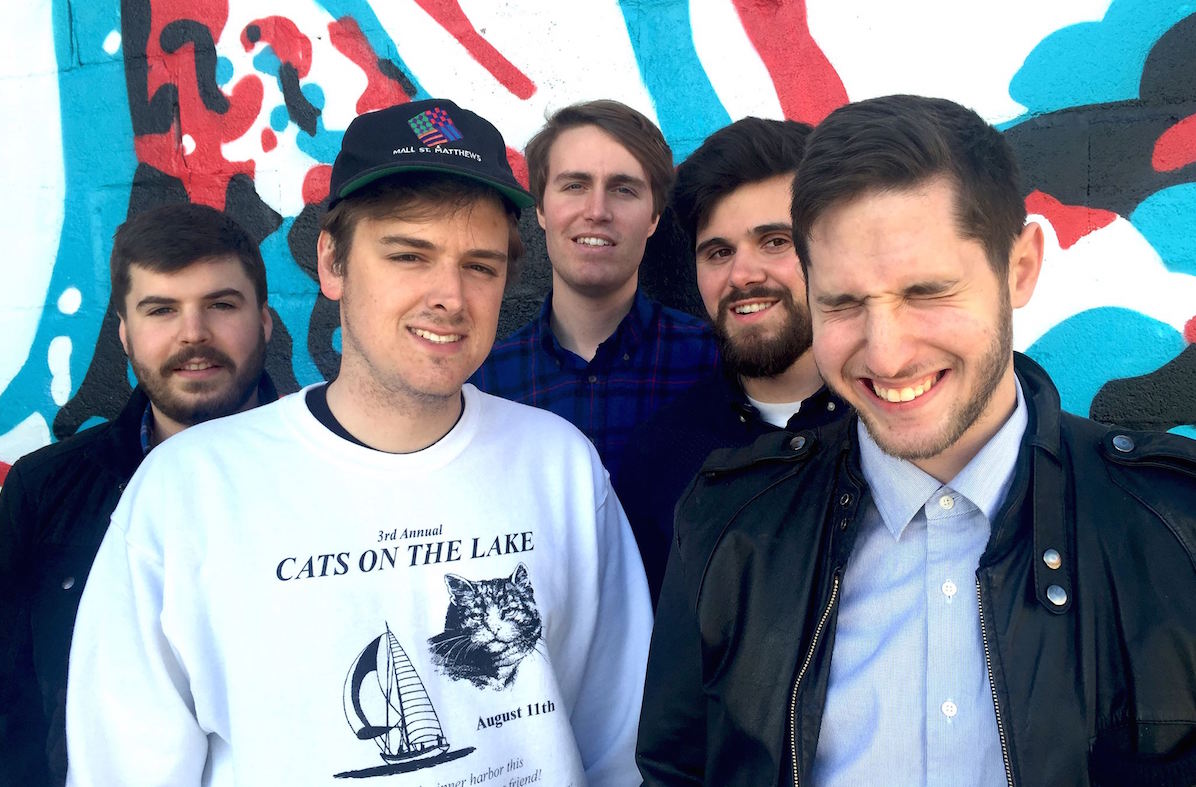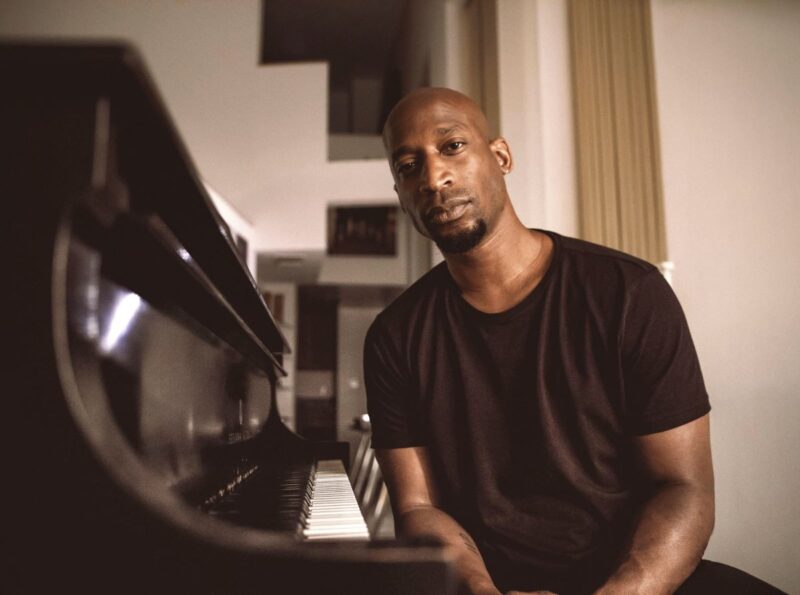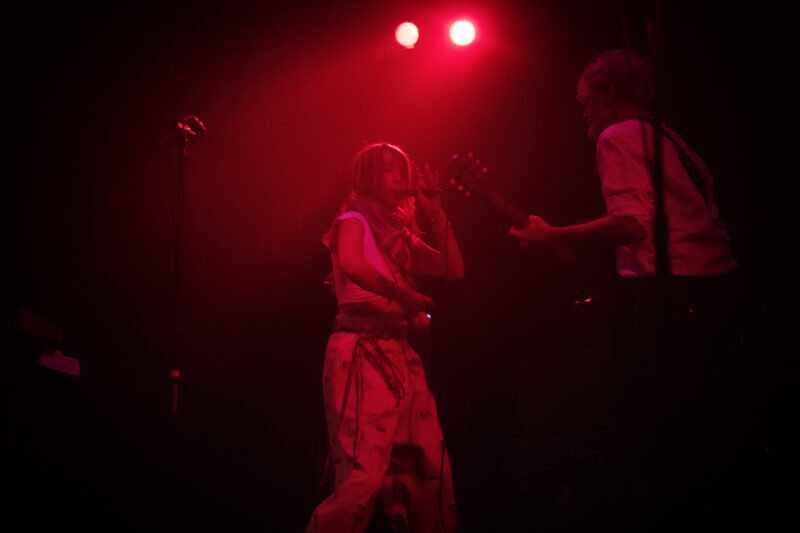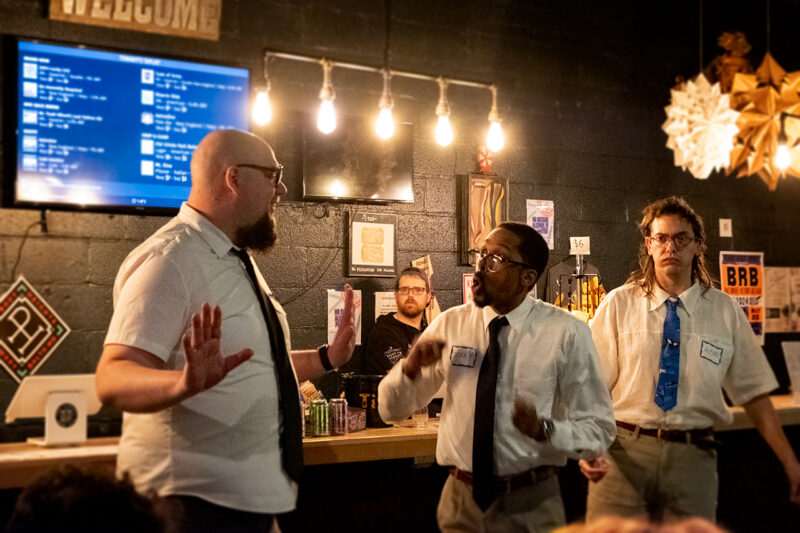An Interview with Surf Harp about their new album Peel by Taylor DeBoer
Several years ago I was recording with Phil Bolton in his parents basement in Towson, MD and he played me a yet-to-be-released cassette of incredibly catchy, raw, surfy rock tunes. Those songs would later be released as an EP called Galápagos under the moniker, Surf Harp. Over the last three years, Surf Harp has evolved into a five-piece band of long-time high school and college friends and they’re on the eve of releasing a masterful debut album, Peel on Friends Records.
Although still catchy, Peel is a far cry from the surf pop of the first EP. It’s an expansive, raw, layered album filled with screeching guitars, heady synth, driving percussion and many, many vocal tracks that creep up from the mix like a spooky trespasser.
I had a chance to chat with the guys of Surf Harp—Phil Bolton, Jeff Koplovitz, Chris Sweeney, Dennis Mizzoni, and Aaron Perseghin—who happen to be very close friends, about their music. I’m not ready to claim Surf Harp as the best Baltimore band, but you’ll search far and (nation)wide for a more unique sound. Perhaps the best way to describe them—while also paying homage to one of the album’s catchier tunes—is with the phrase, “rubber pop.”
Peel is out February 12th on Friends Records. Surf Harp will celebrate the release of their album with a show at The Crown Friday night with :3lON, Raindeer and Us and Us Only.
TD: You guys have been working on this album for a while. How does it feel to have it finished and (almost) out?
JK: It feels great to be done. I am very excited for people to hear it!
PB: It’s definitely been a process. We’ve had such a hand in all of the steps of the release (self-recording, screen printing the album covers, making music videos, etc.) that seeing a final product feels a bit surreal. Excited for people to finally hear songs that we have over-listened to.
TD: Anyone that has heard the first EP, “Galápagos,” knows that this new full-length is a big departure. How did that evolution come about?
JK: The first EP was more so a Phil solo project. I joined the band shortly after the Galapagos release. Over the years, I had accumulated many different demos/ideas that I never got around to working out full band versions of. “Pain Kills” was written four years ago. As we continued playing and practicing, the band became more collaborative. So I started to bring ideas to the table and began co-writing with Phil along with the Aaron, Dennis, and Chris.
CS: Aaron, Dennis, and I were recruited to perform the Galápagos songs live, and eventually Jeff was too, and we were just playing what was already there. Then, with playing new songs as a group, the material evolved differently, especially because we were playing live pretty often and tweaking the songs as we went along.
TD: This album is filled with layered vocals. You’d think that it would get old but you guys do it very subtly. How and why did you guys make the choice?
JK: Conceptually, we wanted this album to be very layered. That is part of the reason we picked the album title PEEL. We wanted the listener to be able to peel back all the layers as if they were peeling a tangerine or something. So the vocal production is a direct result of that decision.
Surf Harp – Europro from Friends Records on Vimeo.
TD: Your videos feature a lot of found footage. I’m referring specifically to the “Leather” video. I want to know about the bad dancers.
PB: That’s a funny story actually. Believe it or not that wasn’t found footage. I started taking those clips a few years ago to eventually use in a music video. They’ve been cultivating in a folder on my desktop since about 2012. The really theatrical dances at the end of the song were videos that I took of an exhibit at a children’s cultural museum that I stumbled into. All of these clips ended up working well with the vibe of the song, so we decided to make dance and movement the subject of the video.
TD: Inspirations. There are obviously a lot and they are varied. Who inspired this album?
JK: In terms of my bass playing and songwriting, I am inspired by a wide range of artists. Everything from Scott Walker to Pavement to Mingus to Aphex Twin. It is difficult to explain the direct effect that this inspiration has on my songwriting. I never say “I really like Neu!, how can I write a song like ‘Hallo Gallo.’” But I guess the verses of “Pomegranate” are a direct result of my love for Krautrock.
PB: It’s pretty interesting how some of our influences surfaced in the instrumentation and songwriting. There wasn’t really a point where we tried to emulate something else in those respects, but it’s interesting to pick up on subtleties that were subconsciously written into the songs. The biggest influences for me on the songwriting and tones of the album were probably Devo and Ween. Actually, there was one part during the mixing where I asked Mat to pitch shift the rototoms on “Pain Kills” to sound like the opening of Mayhem’s album Deathcrush.
TD: Speaking of “Pomegranate,” it’s my favorite track on the album. Tell me about that song.
JK: This song came to us very quickly. I remember Phil and I were setting up to practice one day, and I played that guitar part you hear throughout the verses on the bass. Phil and I agreed that we could develop a song around it. We spent one afternoon coming up with the structure and tossing ideas off of each other. Writing and recording “Pomegranate” was a lot of fun.
PB: “Pomegranate” is probably the most different from the other tracks on the album. We really struggled filling out the song and adding instrumental depth, which became immensely difficult without overcomplicating things. There were countless tracks that we scrapped (a cat, flutes, contact mic’d velcro running shoes, etc.) because we could not organize them in a way that fit the direction of the song. It was not until David Jacober of Dope Body and Alexa Richardson recorded marimba and cello on the song that we realized how special it was.
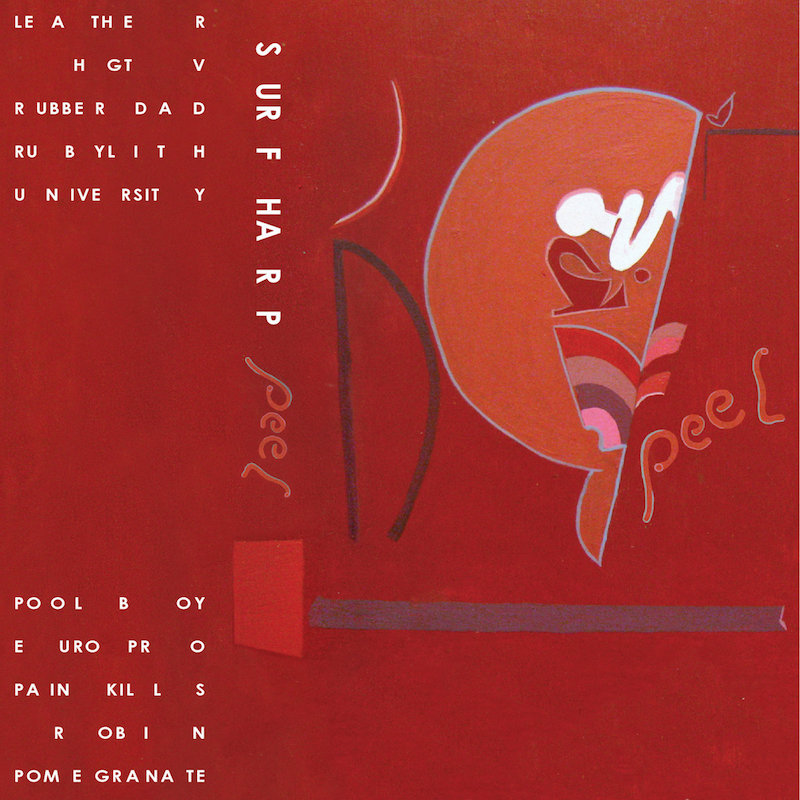
TD: The album art is by D’Metrius John Rice. He’s a local artist, right? Why did you decide on this piece (it’s awesome!)?
DM: I think we were all in favor of using an abstract piece of art for the cover, as opposed to a photo of the band or something along those lines. A few of us were familiar with D’Metrius John Rice’s work and liked it. So we reached out to see if he’d be willing to let us use one of his pieces, he gave us several options, and we sorted through them together. There were a lot of really cool options, but something about this one felt right and everyone agreed that it had to be this one.
TD: The song titles, in some cases, seem to have no relationship to the lyrics. Are they just random words or do they have significance?
JK: You know when you are having a conversation and someone says a phrase or word that connects to you? Conversation is how many of the song titles came about. Language is how we think and comprehend our environment. I’d hear Phil say something like “Jeff, you could be my family’s Pool Boy,” and I would think, “wow, that would be a great song title.”
AP: A year and a half ago, we were working on a new song together and someone checked the news and saw that Robin Williams had died. We started calling that song “Robin” as a placeholder name and it stuck. I think that’s the only song we named as a group.
TD: You guys recorded this album yourselves but had it mixed at Mobtown Studios with Mat Leffler-Schulman. What was that experience like?
PB: Mixing the album with Mat was an amazing experience. He is incredible at what he does and made the album sound better than we could have imagined.
DM: He was extremely helpful in making this album sound the way it does. We were all really excited after we heard the first track he mixed. He does a great job of making the right instruments shine at the right time.
CS: Mat is great to work with because he really gets into the music and is able to pick up on the vibe and understand where you’re going. Then he can use his expertise to help you achieve that. Some producers/engineers try to insert their own vision into the material. I think Mat is really good at getting in tune with what the band wants, and then that becomes what he wants as well.
TD: Friends Records has become quite a big deal in Baltimore. They’ve put out some of the city’s best albums over the past few years. I imagine you guys are psyched to be a part of it. How did the relationship come about?
PB: It’s really an honor to put something out with Friends. I’ve been a huge fan of everything they’ve put out, and getting to know Jimmy has been a great experience. He’s such an awesome guy and what he has done for Baltimore music has been really special. I couldn’t imagine a better person to work with, and I look forward to continue working with Friends.
JK: I am very happy to be part of something that I have been following as a fan since I was in my adolescence. I remember when Friends Records first started, and thinking “it would be amazing to release something with them one day,” especially since so many great records and artists have been a part of the label.
TD: What’s next?
PB: We’ve got a lot exciting things lined up for this spring. We are also writing a lot of new material.
JK: I am constantly writing new material. There is a new one I’m working on that is called “Cemetery Child.” It has this kraut-y driving beat and riff. It’s a little more spacious than anything we have ever done, as well. Hopefully we will start rehearsing, structuring, and recording some of these new demos and the next album will be out sooner rather than later.
AP: Jeff is constantly cranking out new demos. Once we get through this album release we’ll have some more time to flesh those out. Who knows where those songs will end up. You’re sure to hear them live in the coming months.

